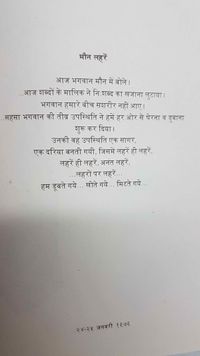Talk:Dariya Kahai Sabda Nirbana (दरिया कहै सब्द निरबाना)
To start with, no traces of a published hard-copy book could be found on the net in the course of compiling info on this book, aside from the old version of the wiki's page for Dariya Kahe. Which was saved and reproduced but it is so sketchy that it may not be supportable. The book in fact may never have been published. Not even an e-book version could be found, only audio.
All the Indian audio sites say there are only nine discourses in this series, though the time span is of course eleven days. What happened? There is an interesting source for an answer, an unauthorized translation of the book into English, squirreled away here. The translator gives dates and times for each discourse, ostensibly eleven discourses, but when you navigate to Discourse 4 & 5 you get a short poetic description of Osho not coming on those two days. This turns out to be a translation of the words actually in the hard copy. Shailendra has sent a scan of the relevant page, and adds that the space that would have been taken by the discourses for those two days was filled in the book with one page for this poetic description and then the rest of the pages with pictures of Osho. Translation is below.
A note on transliteration: A number of possible variations exist for the Latin alphabet rendition of this title, including Kahae, Kahai, Shabad, Shabda, Shabd and Nirbana, in many combinations. Such variety is not off-the-scale unusual, just a little extreme, but it is complicated by not having a Devanagari rendition to correlate with, as no site could be found with a DN version. Oh well. The version chosen reflects commonest usage among Osho-related sites. Shabad and Shabd are used extensively by Sant Mat sites (crypto-Sikh offshoots) who have adopted Dariya as one of their own.
About the title, it apparently comes from a long poem, gone into at length on the santdariya.org site, two lines of which are:
- Dariya kahe sabad nirvana,
- Abari kaho nahi ved bakhana.
which they translate as "Dariya speaks the words of Nirvana. He speaks something else not the repetitions of what we find in different scriptures." Note also the same transliteration.
Lastly, a possible lurch into metaphysics. One cannot help but notice the odd number of discourses, nine for this book – as noted above – and fourteen for Ami Jharat Bigsat Kanwal (अमी झरत बिगसत कंवल), the other book on Dariya. These atypical numbers have arisen from days that Osho did not come for a discourse. This was fairly unusual for those days. Osho was rarely sick and was very regular in his appearances, even punctual. Occasionally a chicken-pox scare would happen ... who knows? In any case, there were two days off during Dariya Kahe and two more days off between Ami Jharat (cutting it short) and the next series, Prem-Panth Aiso Kathin (प्रेम-पंथ ऐसो कठिन). What to make of that? -- Sarlo (talk) 09:03, 16 May 2014 (PDT)
- प्रवचन (TOC):
- 1. अबरि के बार सम्हारी
- 2. वसंत तो परमात्मा का स्वभाव है
- 3. भजन भरोसा एक बल
- 4. आज जी भर देख लो तुम चांद को
- 5. निर्वाण तुम्हारा जन्मसिद्ध अधिकार है
- 6. मिटो, देखो, जानो
- 7. सदगुरु करहू जहाज
- 8. जीवन स्वयं अपनी समाधि है
- 9. सदगुरु सबद सांच एह मानी
"Absence Message"

The fourth and fifth discourse: 24th and 25th January 1979: Osho Commune International, Pune
Osho spoke in silence today.
The Master of language gave away the treasure of wordless, today.
Osho did not arrive in His body amidst us.
Suddenly, Osho's intense presence began to surround us from all sides
And immerse us.
His presence kept becoming a bigger and a bigger ocean,
A Dariya, in which there were waves and more waves,
And then more and more waves, countless waves
... Waves on top of waves ...
We kept drowning ... kept losing ourselves ... kept effacing ourselves ...
